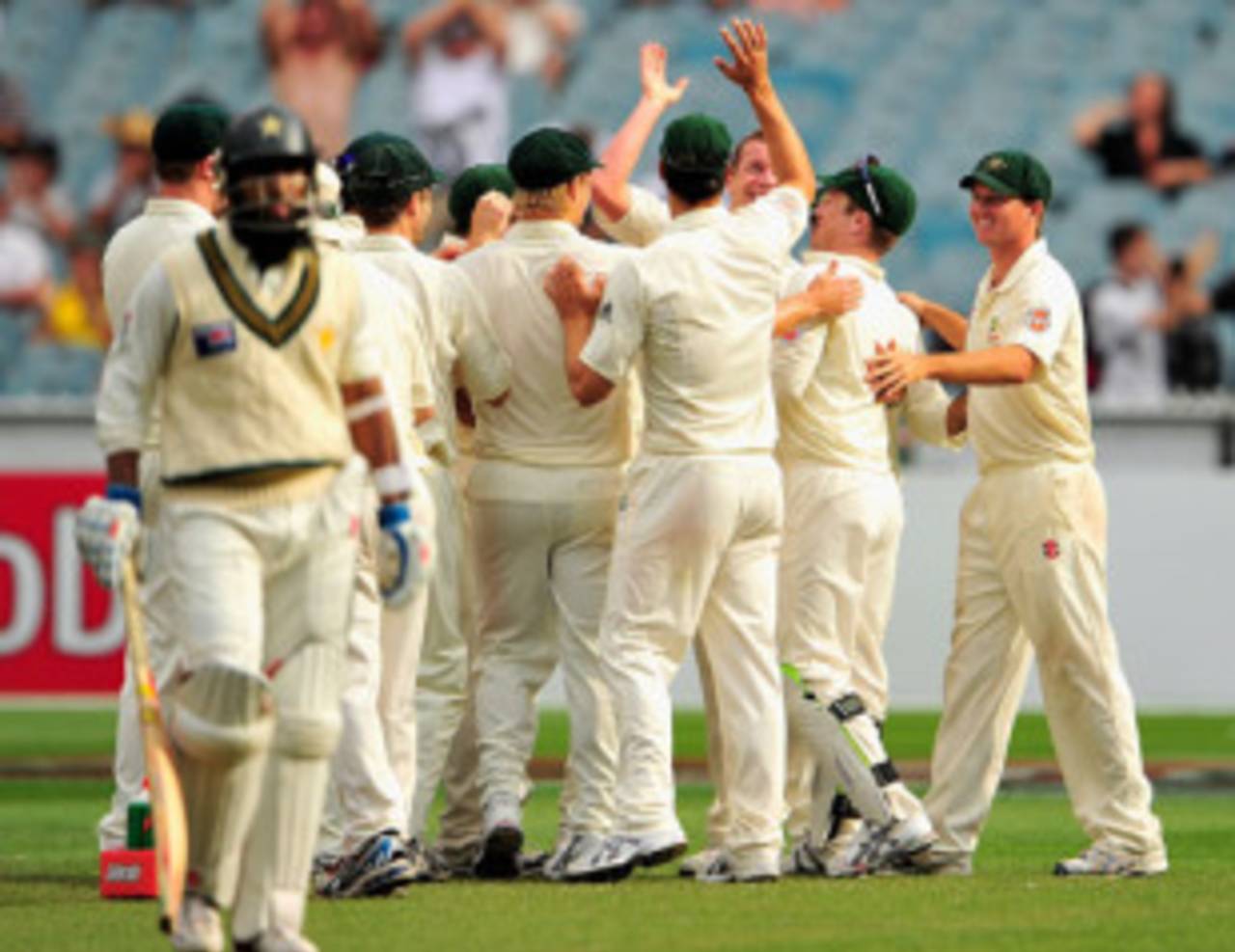Pakistan need to overcome fear
Pakistan must overcome the fear of playing in Australia by displaying more aggression if they wish to meet with any success in the series
Osman Samiuddin at the MCG
Dec 27, 2009, 8:47 AM

Pakistan's performance over the first two days has been reminiscent of their previous failures against Australia • Getty Images
Timidity will kill you on the cricket fields of Australia. Pakistan teams
in recent years have not taken heed of this basic tenet when coming out to
play against Australia, and the hammerings they've experienced have generally been preceded by submission to fear. If this side is going to learn the lesson, it has started off slowly.
It is easy to be meek tourists here. Stadiums, like the MCG, are not
playing fields as much as they are vast, lonely chambers of interrogation.
The sheer size can eat you up. The crowds are huge and loud and
the more you let them get to you, the more they bring it to you.
There used to be days, of course, when the Australian side really brought it
all to bear upon tourists like some brutal theatre; the noise, the crowd,
the glares and chatter from players, forever pecking away at you like some
wild-eyed malevolent woodpecker. Those days are gone but Pakistan have
still been playing their ghosts in this Test; ghosts of men such as
Matthew Hayden, Justin Langer, Shane Warne, Glenn McGrath and their intimidating ways. There are no demons in the pitch or in the bowling. Australia's batting is
solid, but not murderous anymore. And yet Pakistan has played them like it was 1999, not 2009.
The initial selection told it. Abdur Rauf is a sum of many commendable things but
he is not, as is Umar Gul, an attacking fast bowler. Gul may be in an uncertain patch in his career right now, but can anyone deny that he is,
in essence, a wicket-taking bowler? They would've played with two spinners
had Danish Kaneria not been injured, but a case could even be built for
going in with five bowlers. It further weakens an already dodgy batting
order but then Pakistan are not, and have never been, India. They win
Tests with their bowling not their batting. Pakistan's was an honest
effort with the ball, but when did honesty ever win anything?
They then began their innings in the afternoon so meekly it was difficult
to know they were there. Solidity is often the order of the day as far
as Pakistan's opening is concerned, but not sluggishness; surviving 13
overs of the new ball as an opening pair is an achievement for Pakistan,
but going at two-an-over negates that, especially if wickets are never
stable. So unwilling were Pakistan's top three to dictate terms that it
took them 32 overs to find the first boundary, a passage of extraordinary
conservatism in this day and age. Their coach Intikhab Alam didn't think
it was, arguing that stability was needed, this being Test cricket. It is, but not from 1969.
It is precisely why Umar Akmal is so refreshing; he is not timid, in fact,
he may be even a little too cocky, though time will better judge that. But
he has intent and clarity and in these days when the meek no longer
inherit the earth, that can take you places.
Australia have made a national habit out of it. India have been successful
this decade because of it; they've had men like Virender Sehwag,
Sourav Ganguly, Yuvraj Singh and Harbhajan Singh, men who do not take backward
steps and who make themselves known by coming at you. The Pakistan
sides that have been successful in Australia have had such men - Javed
Miandad, Imran Khan, Sarfraz Nawaz, Mushtaq Mohammad and Wasim Akram.
There is natural aggression in this Pakistan side, but it stands strangely
doused and latent. Young men like Mohammad Aamer and Akmal junior have it;
even in Mohammad Asif's wily ways there is a streak. But there are too
many who look restrained and submissive and that cannot be the successful
way. Perhaps it is the natural calm of the leader and though that is
sometimes necessary with Pakistan, it can also be lethargic and reactive.
The aggression somehow needs to be harnessed and a snarl needs to come out
soon, for otherwise the Test and series will be gone before they know it.
Already, the maximum they can hope for here is a draw. And that will be a
kind of victory in itself, given they have lost nine on the trot against
Australia. But that cannot be the extent of their ambition, not in this
land. Somehow they have to open up, they have to chance it and really let
themselves go.
Osman Samiuddin is Pakistan editor of Cricinfo